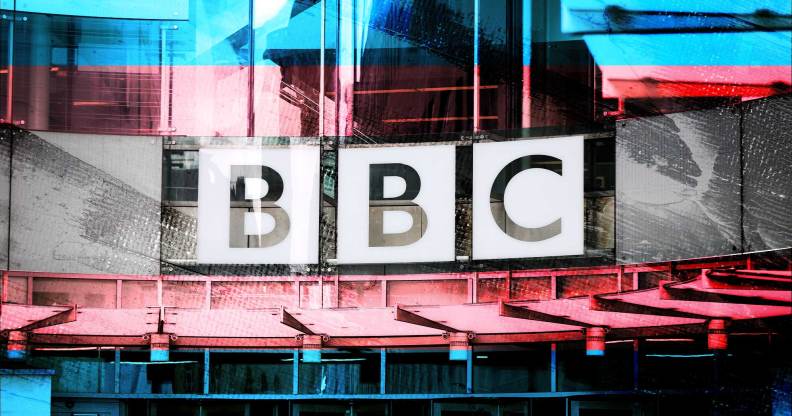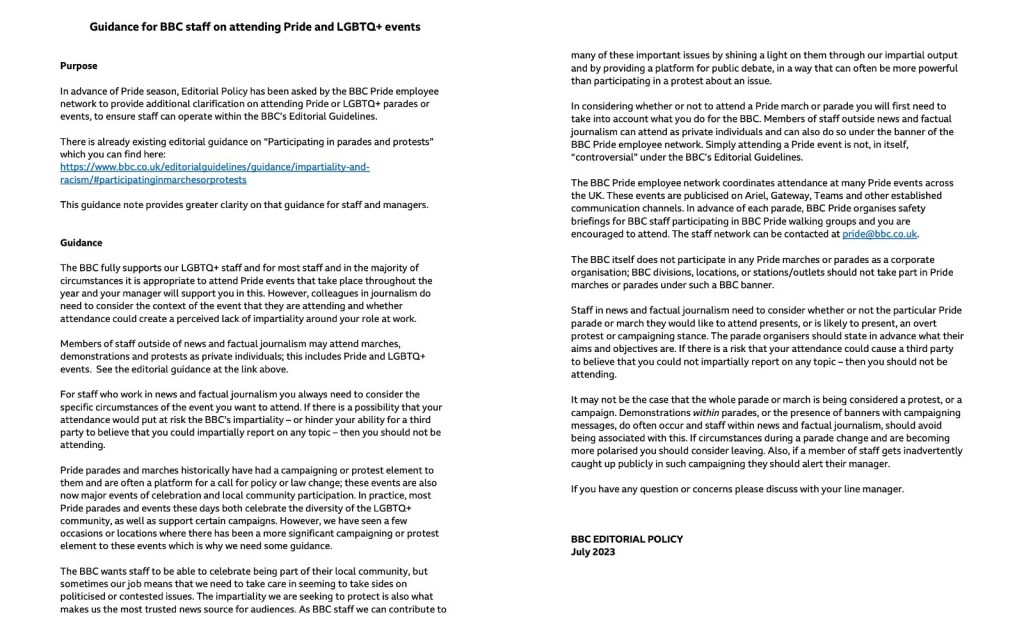BBC reissues ‘out of touch’ guidance advising news staff not to attend ‘overt’ Pride protests

Guidance provided to BBC staff advises editorial employees to avoid attending Pride and LGBTQ+ events in a bid to maintain impartiality. (Getty)
The BBC has advised its news employees to consider avoiding attending any Pride events that might be considered a protest, in a bid to maintain ‘impartiality’ on LGBTQ+ issues, in guidelines shared with staff this month.
The guidelines have been condemned by employees of the broadcaster, with one telling PinkNews the guidelines “fail” its LGBTQ+ staff members.
The guidelines, which have been seen by PinkNews, follow the BBC first advising against BBC news and factual staff attending Pride ‘protests’ in 2020.
The BBC Pride guidance, sent to staff at the start of July 2023, states: “Staff in news and factual journalism need to consider whether or not the particular Pride parade or march they would like to attend presents, or is likely to present, an overt protest or campaigning stance.”
Should the events be likely to cause a third party to believe staff could not impartially report on any topic, it is recommended they not to attend, and inform a manager if they plan to do so.
The BBC tells PinkNews there is no ban on staff attending Pride events.
A BBC source, who wishes to remain anonymous, criticised the guidelines and tells PinkNews the BBC’s bosses “fail to completely understand LGBTQ+ issues and the impact they have for staff”.
‘A diabolical lack of faith in the leadership’
The source accuses the BBC’s upper management of not understanding Pride or what it means “to be LGBTQ+ in modern Britain”.
“Our existence has become inherently political and celebrating our identity with others from our community should not be deemed controversial simply because our community is at the centre of a moral panic,” they add.
“It’s not escaped anyone’s notice that this guidance came out around the same time that Pride in London was celebrated with the theme of trans allyship.
PinkNews understands the document was sent to senior managers on Monday (3 July), just days after Pride in London was held, and just a few days before the capital hosts London Trans Pride, on 8 July.
The theme of this year’s Pride in London protest was ‘Never March Alone’, in support of the trans community.
The BBC source continues: “Recent staff survey results showed a diabolical lack of faith in the leadership of the organisation and senior management, and this – to many staff – will serve as further proof that they’re out of their depth, out of touch with staff and most of all out of touch with what the public wants from the BBC.”

In October 2020, director-general of the BBC, Tim Davie, introduced the guidelines on Pride alongside strict social media rules.
At the time, Davie said journalists could attend Pride parades if they were not “taking a stand on politicised or contested issues”.
The guidance states: “BBC News and current affairs staff and some factual staff, as set out in the guidelines, should not participate in public demonstrations or gatherings about controversial issues.”
Davie said that staff outside of news, current affairs and factual journalism could attend marches, demonstrations and protests as private individuals.
He said that those who work in the mentioned editorial departments can attend “community events that are clearly celebratory or commemorative and do not compromise perceptions of their impartiality”.
‘Every time I walked through the BBC doors it was a protest’
Journalist and broadcaster Shivani Dave, who is non-binary trans and who was employed at the BBC in 2020 when rules around news staff attending Pride events were first introduced, describes the guidance as “appalling”.
“When this was proposed as ‘guidance’ to staff at the BBC in 2020 it was a clear indication that it was deployed in a way to prevent employees at BBC News showing their support for trans people,” they tell PinkNews.
“BBC News had created their own arbitrary line on what parts of identity were and weren’t political by suggesting if the Pride event was a ‘party’ people could attend but not if it was a ‘protest’.”
“I was working at an organisation where being trans was treated as controversial, every time I walked through those doors it was a protest – and a party. It is an appalling state when the national broadcaster is so invested in a culture war that even suggesting that trans people are worthy of respect and dignity can ruffle feathers at BBC News.”
A spokesperson for BBC News told PinkNews: “We have longstanding guidance for staff which covers attending marches, parades, demonstrations and protests, and this latest clarification was produced at the request of our staff network, BBC Pride.
“Our guidance on impartiality is there to protect BBC journalists and the BBC, and as we have made clear in the past there is not, and never has been, a ban on staff attending Pride events.”
Despite claims that BBC guidance is in place to retain impartiality, in March 2023, the broadcaster came under fire after it removed Gary Lineker from Match of the Day after the host compared the language used in the government’s new asylum policy with 1930s Germany.
Lineker’s tweets were deemed a breach of the BBC’s rules on “maintaining our impartiality on social media”.
How did this story make you feel?

